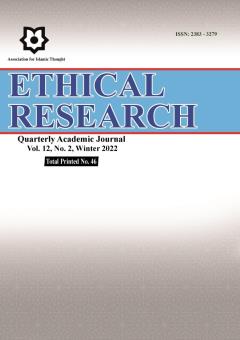Comparative comparison of Ibn Khaldun's theory of nervousness, Weber's charisma and Pareto elites in the rise and fall of the Qajar dynasty
Subject Areas : Ethics and Islamic EducationQasem Gol Hosseini 1 , Monireh Kazemi Rashed 2 , Shahrzad sasanpur 3 , Davood Ebrahimpour 4
1 -
2 -
3 - Islamic Azad University of Shabestar Branch
4 -
Keywords: Ibn Khaldun Nervousness, Weber Charisma, Pareto Elites, Rise and Fall of the Qajar Dynasty.,
Abstract :
History is the science of analyzing past events. Based on this science, historical events are discussed and studied in a time and space sequence. The purpose of this study is a comparative comparison of the theories of Ibn Khaldun's nervousness, Weber's charisma and Pareto elites in the rise and fall of the Qajar dynasty in order to fill the research gaps in this regard. The research method is comparative-historical comparison. Documents will also be used in this method. The findings of the research are that Ibn Khaldun in his introduction has used and generalized the concept of nervousness in explaining how and why the periodic evolution of history, emergence and fall of dynasties. According to Ibn Khaldun, nervousness is the unity and social solidarity between a group, tribe, people and nation. Max Weber also considers the three sources of legitimacy and political authority in social movements in three aspects (tradition, rationality and charisma). Charisma refers to the character of a person who, in person or in the eyes of others, has extraordinary leadership power. Also in Pareto's elite displacement theory, among the members of a group, the most deserving members of that group are called elites. The results of the study show that following the gradual decline of the Safavid dynasty and the invasion of the Afghans, the nervousness, charisma, elitism and, above all, the legitimacy of the Safavid rulers and rulers were questioned and Nader Shah replaced Karim Khan Zand after a while; But with the death of Karim Khan and during the rule of Lotfali Khan Zand, the leaders of Qajar people and especially Agha Mohammad Khan Qajar with the power of nervousness, charisma and elite among his people, in 1117 A.D. was able to subdue them and cause the emergence of Qajar dynasty. But again, during the inevitable tradition of the evolution of history, his untimely death left his heirs unable to expand their dominance alongside influential global factors such as the Iran-Russia wars, World War I, British intervention, and internal factors. And by reducing the force of nervousness, charisma and elite in Aqaba, the Qajar rulers, to prepare the ground for the removal of Ahmad Shah and the fall of the Qajar dynasty and the rise of Reza Khan and the emergence of the Pahlavi dynasty in 1304 AH.
آرون، ریمون (1396) . مراحل اساسی اندیشه در جامعه شناسی ، ترجمه باقر پرهام ، جلد دوم ، تهران ، سازمان انتشارات و آموزش انقلاب اسلامی .
ابن خلدون،عبدالرحمن بن محمد(1359) مقدمه ابن خلدون، ترجمه محمدپروین گنابادی،ج ا ،تهران:بنگاه ترجمه و نشر کتاب.
اشپولر ، برتولد (1351). تاریخ مغول در ایران ، ترجمه محمود میر آفتاب ، تهران : انتشارات بنگاه ترجمه و نشر کتاب.
الگار، حامد(1356) دین و دولت در ایران، نقش علما در دوره قاجار، تهران:انتشارات توس.
توین بی ، آرنولد (1378). تاریخ تمدن ، ترجمه آژند، یعقوب ، تهران : انتشارات مولی.
شمیم،علی اصغر(1371) ایران در دوره سلطنت قاجار، تهران: انتشارات علمی.
طباطبایی،محمد جواد(1373) زوال اندیشه سیاسی در ایران، تهران: انتشارات کویر.
کوزر ، لوئیس (1396). زندگی و اندیشه بزرگان جامعه شناسی ، ترجمه ثلاثی ، محسن ، تهران : انتشارات علمی ، چاپ نهم .
کلیفوردباسورث،ادموند() سلسله های اسلامی، ترجمه فریدون بدره ای.
لمبتون،آن(1395). نظریه های دولت در ایران، ترجمه چنگیز پهلوان، تهران:کتاب آزاد.
آقازاده،جعفر و حسینی،سجاد."منابع مشروعیت حکومت آغا محمد خان قاجار" جستارهای تاریخی،پژوهشگاه علوم انسانی و مطالعات فرهنگی، سال هشتم، شماره دوم،پاییز و زمستان 1396، صص 171-198.
.حجاریان، سعید."نگاهی به مسئله مشروعیت" فصلنامه راهبرد.شماره3 بهار1373.
راش ، مایکل (1388). جامعه و سیاست ،ترجمه منوچهر صبوری ، تهران : انتشارات سمت.
سیدولیلو ، میرمحمود ( 1398) . سفربه درون خود ( کاربست نظریه های شخصیت ...) تهران : انتشارات نارون پژوهش.
مدیرشانه چی،محسن(1373)تاریخ ایران و دیدگاه نخبه گرایی,فصلنامه نگاه نو,فروردین و اردیبهشت 1373.
واعظ،نفیسه." انتقال قدرت از قاجاریه به پهلوی. فصلنامه علوم سیاسی 1382. شماره 24. زمستان 1382/11/1.
http:wwwporseman.com/article/147706
1.laikie , Norman )2004 (. " Analayzing Quantitive Data From Description to Explanation " , SAGE Publications, London, Thousand Oaks, New Delhi
2.Skocpol, Theda,)2014(. "History and Theory " , Vol.1 ,
No.1, Published by : Wiley for Wesleyan University.


